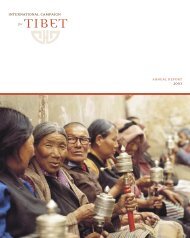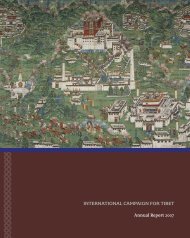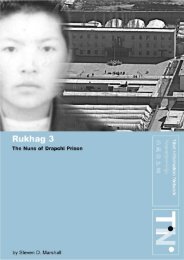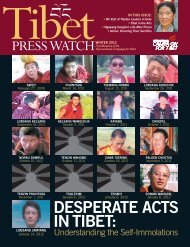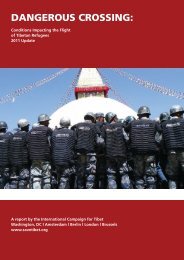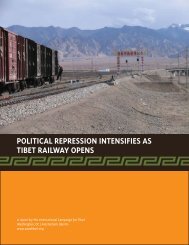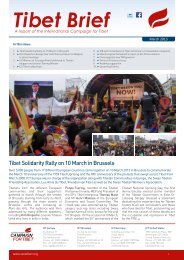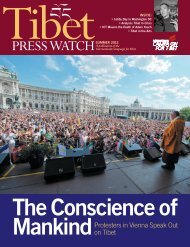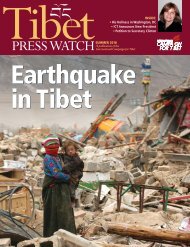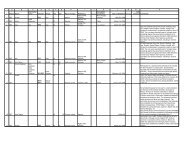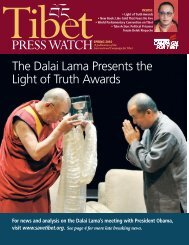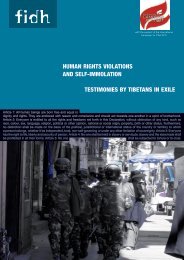download the report - International Campaign for Tibet
download the report - International Campaign for Tibet
download the report - International Campaign for Tibet
Create successful ePaper yourself
Turn your PDF publications into a flip-book with our unique Google optimized e-Paper software.
TIBET AT A TURNING POINT: THE SPRING UPRISING AND CHINA’S NEW CRACKDOWN<br />
(see below), who worked under Hu at <strong>the</strong> CYLC headquarters in Beijing; <strong>the</strong> Party Secretary<br />
of Sichuan province, Liu Qibao, who used to head <strong>the</strong> Anhui provincial CYLC;<br />
as well as <strong>the</strong> Party Secretary of Qinghai province, Qiang Wei, and Qin Guangrong, <strong>the</strong><br />
Governor of Yunnan province, both of whom have also headed provincial CYLC<br />
offices, and who largely owe <strong>the</strong>ir careers to President Hu’s patronage.<br />
Historian Tsering Shakya indicated recently that within <strong>the</strong> Party, <strong>the</strong> successes of<br />
some of <strong>the</strong>se key figures are under question due to <strong>the</strong> unrest in <strong>Tibet</strong>an areas since<br />
March: “Within <strong>the</strong> Party discussions are taking place as to whe<strong>the</strong>r Hu will save himself<br />
by dismissing some of those he promoted, or whe<strong>the</strong>r his entire entourage will<br />
come under attack. […] But everything now hinges on <strong>the</strong> Olympics. Until <strong>the</strong>n <strong>the</strong> government<br />
is paralysed — if <strong>the</strong>y take any action be<strong>for</strong>e <strong>the</strong> Games it will bring doubts<br />
and uncertainty, and I think <strong>the</strong>y will wait until <strong>the</strong>y are over be<strong>for</strong>e making any<br />
major changes.” 2<br />
The imposition of martial law in Lhasa on March 9, 1989 presaged martial law in Beijing<br />
three months later, and <strong>the</strong> killings in and around Tiananmen Square after <strong>the</strong> student<br />
and workers’ protests. Although known to be closely associated with <strong>the</strong><br />
relatively moderate Party General Secretary Hu Yaobang, whose death in April 1989<br />
was <strong>the</strong> catalyst <strong>for</strong> <strong>the</strong> student demonstrations in Tiananmen Square, Hu Jintao was<br />
quick to consolidate his conservative credentials. When Deng delivered a televised<br />
speech soon after <strong>the</strong> Tiananmen Massacre praising <strong>the</strong> army <strong>for</strong> “putting down <strong>the</strong><br />
counter-revolutionary rebellion”, Hu Jintao convened <strong>the</strong> TAR Party Committee to<br />
study <strong>the</strong> speech, making him one of <strong>the</strong> first provincial leaders in <strong>the</strong> PRC to display<br />
allegiance to Deng. Despite still being TAR Party Secretary, Hu spent most of <strong>the</strong> years<br />
1990 to 1992 in Beijing, building networks and alliances which frequently brought<br />
him into to contact with Deng, who publicly praised Hu on several occasions. 3<br />
This open expression of support <strong>for</strong> Deng was critical to Hu’s rapid ascent — it was<br />
Deng who picked Hu as a potential successor to Jiang Zemin in 1992. And it was Hu’s<br />
tough handling of <strong>the</strong> <strong>Tibet</strong>an protests in <strong>the</strong> late 1980s that brought him to Deng’s<br />
attention. Tensions had been simmering in <strong>Tibet</strong> since <strong>the</strong> mid-1980s, with unrest<br />
and some demonstrations against Chinese rule from 1987. In language that is almost<br />
identical to <strong>the</strong> statements of <strong>the</strong> Party now about <strong>the</strong> <strong>Tibet</strong> protests (although<br />
arguably less specific about <strong>the</strong> Dalai Lama’s supposed involvement), in 1989 Hu was<br />
quoted as saying that <strong>the</strong> unrest was a result of conspiracies “by separatists both within<br />
and outside <strong>the</strong> country, who have been aided by hostile <strong>for</strong>ces abroad” (‘Hu Jintao<br />
on <strong>the</strong> situation in <strong>Tibet</strong>,’ Xinhua, December 23, 1989.)<br />
96



